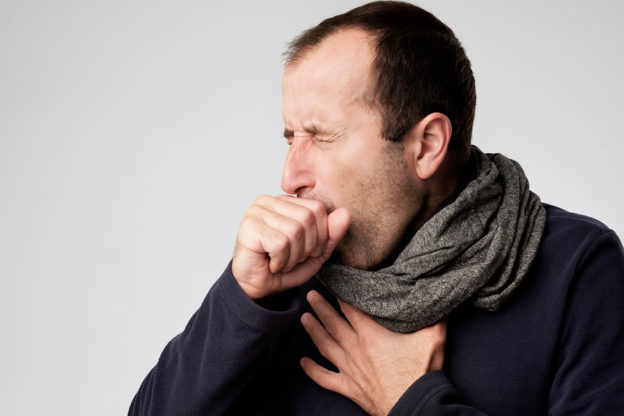By David Blyweiss, M.D., Advanced Natural Wellness
December 4, 2017
- It’s official. Cough medicines don’t work.
- The science behind your cough
- Here’s how to get rid of a nasty cough
It’s cold and flu season again. And one of the most annoying symptoms that come with these viral infections is the constant cough that never seems to go away. Sometimes it’s enough to make you feel like you’re going to hack your lungs right out of your throat.
As a result, I hear the same questions day after day…
… “Should I buy Robitussin or Mucinex?”
… “Do I need a suppressant or an expectorant?”
… “Will an antihistamine help dry me up?”
MD Exposes the Hidden Danger to Your Eyes

When your eyesight starts to fail, it's a real problem. Suddenly you can't go to the grocery store... you can't get to the doctor if you have an emergency... you can't meet your friends for dinner…
Your "regular" doctor doesn't have time to keep up with the latest research. And the same goes for eye doctors. They go to school to learn how to fit you for glasses and contacts, but have no way of preventing the damage and loss of eyesight that threatens your freedom and independence.
Let me show you something that explains a LOT about how your eyes work.
In my FREE Special Report, I'll show you a HUGE, untapped resource for your eyes that safely and naturally restores clear, effortless eyesight.
Click here to get started...
… “If I take an anti-inflammatory pain killer will my cough go away faster?”
Personally, I don’t recommend any of these options as a resolution to calm those hacking, lung-wrenching coughs coming from your chest. And it might surprise you to learn that the American College of Chest Physicians doesn’t recommend them, either.
In fact, this prestigious group reports against the use of over-the-counter cough and cold medicines to control your cough. They also lean away from the use of nonsteroidal anti-inflammatory agents.
On top of that, they say there is absolutely no evidence to support the use of cough suppressants, expectorants, mucus thinning agents, antihistamines or any combination of these products for reducing cough.
Why do you cough in the First Place?
Here’s the thing. On average, a typical cold-related cough lasts for about three weeks … sometimes even longer. And there is a reason for that.
Coughing is a protective measure. It is one of the strongest if not the strongest reflex in the body. It’s a mechanism designed to break down mucus and get it out of your lungs when you’re sick. As you expel this mucus, whatever viral, bacterial or other infection that started your symptoms in the first place is forced out of your lungs.
Over-the-counter meds won’t speed that process up. Plus, some of the ingredients found in them are decidedly bad for you.
One of the worst is something called dextromethorphan. On labels you might see it listed as DM or DXM. This cough suppressant has all sorts of weird side effects that can leave you feeling shaky, nervous, restless and drowsy – all at the same time.
Are You Suffering From...
- Love handles and a pot belly
- Romance that isn't what it used to
- Forgetfulness and inattention
- Low (or no) strength and endurance
- A sex drive that's shifted into neutral...or worse
If so...you may have Mature Male Burnout. Click here to discover more about this unique condition and what you can do about it.
Antihistamines may contain anticholinergic compounds associated with dementia and loss of mental faculties. The FDA warns that NSAID pain relievers can increase your risk of heart attack or stroke in just a matter of weeks.
If these medications do nothing to speed recovery or tame your cough, why take them in the first place?
That being said, your best bet is to naturally alleviate symptoms by thinning down all of that mucus build-up that triggers your cough reflex.
How to Get Rid of a Nasty Cough
One of the best ways to loosen mucus is to keep your mucus membranes moist by drinking plenty of liquids. But I’m not talking about the sweet and sugary kind. Refined sugars are very pro-inflammatory, which will increase the production of mucus.
A tall glass of water several times a day will do you a world of good. Hot tea or warm water with a little ginger, honey and lemon are even better. The steam from these heated beverages helps break down mucus even further. At the same time, they contain multiple anti-inflammatory compounds that may help control coughing.
Good, old-fashioned chicken soup is especially good for breaking up mucus and soothing a cough. That’s because the ingredients help reduce the inflammatory response that triggers the release of mucus.
Taking 15 minutes of breathing in a steamy shower will also help loosen up all of that thick gunk that makes you want to cough.
One of the tricks I learned a long time ago is to place a few drops of eucalyptus or menthol oil in a small container and place it into the shower. Place it in an area where the shower spray won’t wash it away. As the steam from the hot water releases the vapors, it will help clear out your throat and sinuses. You don’t even have to get in the shower, you can just sit on the toilet seat and breathe.
Post-nasal drip after a cold or flu can cause a back-up of mucus in the throat that makes you want to cough. This is another symptom that your immune response is still in overdrive… trying to get rid of foreign invaders in the throat and nostrils.
Try flushing your nasal passages with a probiotic sinus rinse. This will infuse your nostrils with healthy bacteria and help displace those that aren’t so healthy. Just mix a regular probiotic capsule with 8 ounces of saline solution.
Then, use a neti pot or rubber ear bulb to gently flush each nostril with the formula before bedtime each night.
SOURCES:
Malesker MA, et al. Pharmacologic and Nonpharmacologic Treatment for Acute Cough Associated With the Common Cold: CHEST Expert Panel Report. Chest. 2017 Nov;152(5):1021-1037.
Gray SL, et al. Cumulative use of strong anticholinergics and incident dementia: a prospective cohort study. JAMA Intern Med. 2015 Mar;175(3):401-7.
FDA Drug Safety Communication: FDA strengthens warning that non-aspirin nonsteroidal anti-inflammatory drugs (NSAIDs) can cause heart attacks or strokes. Safety Announcement. U.S. Food and Drug Administration. July 2015
American College of Chest Physicians. “New Study Supports Chicken Soup As a Cold Remedy.” ScienceDaily. Oct 2000.







